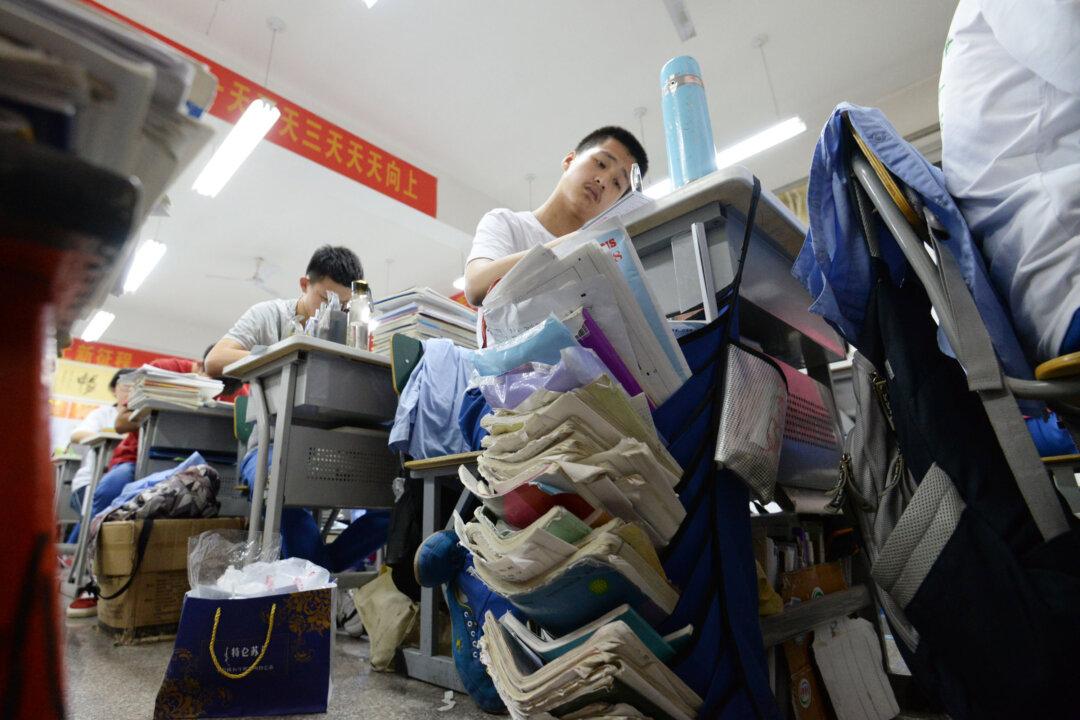China wants to accomplish its science and tech development goals by solidifying the Chinese Communist Party’s (CCP) grasp of the education system, while exporting its influence overseas through education initiatives in “One Belt, One Road” partner countries, according to a new directive.
The Party’s Central Committee, an about 200-member body of elite officials, and the cabinet-like State Council co-announced “China Education Modernization 2035” for all education agencies and organizations in the country on Feb. 23.
The plan, published on state-run media Xinhua, sets eight targets to be achieved by 2035, including providing quality pre-school, primary school, and middle school education; increasing high school enrollment; strengthening “political and ideological education” within higher education; and establishing a vocational education system for adults. Political education involves learning about Party ideology and policies.
It also clearly dictates the education system “to work for the CCP’s ruling,” “adhere to the Party’s leadership,” and facilitate “the Party to lead the education system in all aspects.”
The plan includes ways to increase China’s “competitiveness,” focusing on science and technology development, which has been the Chinese regime’s area of interest in many economic policies, in order to become a tech manufacturing superpower. This includes building “world-class of universities for each academic subject,” “setting up a group of world-class science and technology innovation bases,” and forming “a complete chain for innovation from study, research, design, application, to industry.” The Chinese regime has a pattern of acquiring intellectual property via academic espionage, including by recruiting top engineers and scientists around the world to work in China.
In the realm of foreign affairs, the plan asks education agencies to push One Belt, One Road (OBOR)—Beijing’s foreign-policy initiative to build influence by financing infrastructure projects around the world—by “sharing operational standards and experiences with other countries.”
China Education Modernization 2035 also urges the country’s universities to set up more Confucius Institutes, Confucius Classrooms, and “Luban Workshops” overseas, particularly in OBOR countries.
Luban Workshops have been dubbed the “Confucius Institute of vocational education” by the state-run China National Radio. The first workshop was founded in Thailand in 2016 for teaching mechanical manufacturing skills, while the second one, teaching Chinese culinary skills, was set up in London in 2017.
State-funded Confucius Institutes, established on university campuses around the world since 2004 with the stated purpose of “promoting Chinese language and culture,” are a controversial creation, as the United States and other governments have cited concerns about their stifling of academic speech critical of the Chinese regime, as well as their exploitation of mainland Chinese students to conduct espionage.
Confucius Classrooms are akin to Confucius Institutes for overseas primary schools, middle schools, and high schools. The Chinese regime has set up 548 Confucius Institutes and 1,193 Confucius Classrooms in 154 countries, according to a December 2018 report by Xinhua.
In recent years, universities in the United States, Canada, France, and Sweden have closed Confucius Institutes on their campuses.
The National Defense Authorization Act signed into law by U.S. President Donald Trump last year bars U.S. universities from using Pentagon funding resources for any program involving Confucius Institutes.
Education Minister Chen Baosheng published an article in the state-run People’s Daily on Feb. 22, emphasizing the Party’s role in all universities, including foreign-invested ones. There are at least nine foreign-invested universities, including one set up by Duke University in Kunshan City, Jiangsu Province.
Chen asked all schools to promote Chinese leader Xi Jinping’s Party ideology, “the new era of socialism with Chinese characteristics” in all academic fields, course material, and textbooks.
“Ideologically, all teachers and students in China’s universities must be on the same page with the CCP’s Central Committee.”





